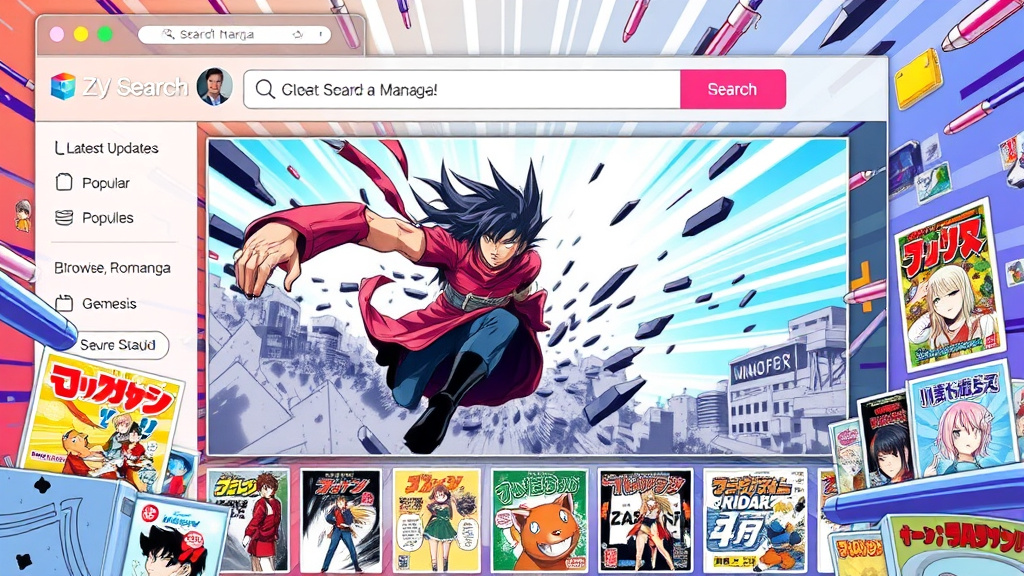In recent years, the landscape of manga consumption has transformed dramatically, driven by the proliferation of online manga libraries. These digital repositories have revolutionized how fans access, share, and enjoy manga stories from around the world. Whether you're a seasoned manga reader or a curious newcomer, understanding the dynamics of the online manga library is essential to tapping into this vibrant, ever-growing universe.
The online manga library serves as a virtual treasure trove, offering vast collections that transcend geographical and linguistic barriers. This article delves deep into the evolution, features, legal considerations, platform comparisons, industry impact, community dynamics, future trends, and practical tips that shape this digital phenomenon.
The Rise of Online Manga Libraries - A Comprehensive Overview
The advent of the internet brought about a seismic shift in media consumption, and manga was no exception. Originally confined to print and dedicated comic shops, manga became widely accessible through online platforms in the early 2000s. These early websites were often informal, relying on scanlations and fan translations that, while passionate, raised legal and ethical concerns.
Today, the development of dedicated online manga libraries has formalized access, offering licensed, high-quality content with user-friendly interfaces and vast catalogs. This transition from fan-made sites to legitimate digital libraries indicates a maturation of manga as a global art form. The convenience of instant access, coupled with the increasing availability of devices capable of streaming, reading, and downloading manga, has made online manga libraries indispensable to fans worldwide. The rise reflects a collective desire for more accessible, diverse, and affordable manga consumption that aligns with modern digital lifestyles.
In essence, online manga libraries represent an evolution from niche hobbyist sites to mainstream digital ecosystems, shaping not just how manga is read but also influencing publishing practices, fan engagement, and cultural dissemination.
 Hình minh họa: online manga library – high quality manga online
Hình minh họa: online manga library – high quality manga onlineKey Features to Look for in an Online Manga Library
When selecting an online manga library, the array of features available can significantly influence your reading experience. A top-tier platform offers more than just a vast catalog; it should encompass intuitive navigation, high-quality scans, and a user-centric interface that aligns with diverse preferences. Features such as personalized reading lists, customizable reading modes (like dark mode or zoom options), and seamless search capabilities elevate engagement and make browsing enjoyable rather than cumbersome.
Beyond these basics, community features are increasingly important. Forums, comment sections, and social sharing options foster interaction among readers, creating a sense of community within the digital space. Note that multimedia integration—such as audio commentaries or animations—can further enhance the storytelling experience. Ultimately, the ideal online manga library balances content accessibility with interactive features and excellent user experience, ensuring that readers can dive into their favorite stories effortlessly while feeling part of a larger manga community.
Furthermore, supporting multiple devices, offline reading options, and multilingual translations are critical features for global users. These elements make the library versatile, adaptable, and inclusive, broadening manga's reach and accommodating different user requirements.

Navigating the Legal Landscape of Online Manga Streaming
One of the most complex aspects of engaging with online manga libraries pertains to legality. The proliferation of unlicensed manga sites has created a confusing environment for readers seeking legitimate sources. Licensed online manga libraries operate under licensing agreements with publishers, ensuring that creators receive fair compensation—a vital component for the sustainability of the industry.
Legal streaming platforms often adhere to strict copyright regulations, providing high-quality scans and translations, which not only supports the industry but also offers users a more reliable and safe browsing experience free from malware and intrusive ads. However, the line between licensed and unlicensed platforms can sometimes be blurry, prompting users to perform due diligence before supporting a platform. Laws regarding digital content distribution vary across countries, adding another layer of complexity.
Educating yourself about licensing, regional restrictions, and the importance of supporting official sources plays a crucial role in fostering a healthy manga ecosystem. By choosing legitimate online manga libraries, readers contribute to the growth of the industry, ensuring more quality content and new stories in the future.
Subscription vs. Free - Choosing the Right Online Manga Library Model
The landscape of online manga libraries offers a spectrum of access models, primarily divided into subscription-based services and free, ad-supported platforms. Subscription models typically provide an ad-free experience, early access to new chapters, and a broader catalog, often including exclusive titles or higher-quality scans. For avid readers who consume manga regularly, investing in a subscription can significantly enhance enjoyment and convenience.
Conversely, free platforms provide an accessible entry point for casual manga readers, often supported through advertising revenue. While these sites may have limitations, such as delayed chapter releases, limited selection, or reduced image quality, they eliminate financial barriers, making manga accessible for wider audiences. The decision often hinges on reading frequency, preferred quality, and willingness to support official releases through subscriptions.
Ultimately, a balanced approach might involve using free platforms for casual browsing and exploring subscription services for a richer, uninterrupted reading experience. Supporting licensed platforms financially ensures sustained content production, which benefits both creators and fans.
Exploring Popular Online Manga Library Platforms and Their Strengths
Several online manga libraries have emerged as leaders, each with unique strengths tailored to different types of readers. Platforms like Crunchyroll Manga combine extensive licensed content with popular anime adaptations, appealing to fans who enjoy multimedia integration. VIZ Manga offers a massive catalog of both new and classic titles, coupled with a seamless app and cultural insights, making it a favorite among dedicated fans.
Manga Plus by Shueisha is renowned for releasing manga simultaneously with Japan, satisfying the desire for "simulpubs," while providing official translations and supporting industry growth. Other platforms like ComiXology and Webtoon target niche markets, offering webcomics and indie titles alongside traditional manga.
The strengths of these platforms extend beyond their extensive catalogs—they often feature user-friendly interfaces, community engagement tools, and strong support for mobile devices. Evaluating these strengths helps readers choose a platform aligned with their preferences, whether it’s for casual reading, language learning, or in-depth engagement with manga culture.
How Online Manga Libraries are Impacting the Traditional Publishing Industry
The digital shift has disrupted traditional publishing models, challenging brick-and-mortar stores and print media with a new paradigm of instant accessibility. Online manga libraries have democratized access, allowing readers worldwide to discover a diverse array of titles beyond the constraints of physical distribution. This democratization has implications for regional markets, licensing negotiations, and revenue streams, prompting publishers to adapt their strategies for digital distribution.
Moreover, modern online libraries have influenced the types of manga being produced, with some publishers emphasizing "digital-first" titles or shortening release cycles to cater to online audiences that demand instant gratification. The integration of user data and analytics has also enabled publishers to tailor content to reader preferences, influence marketing strategies, and plan future releases accordingly.
This shift not only accelerates the consumption of manga but also encourages more creators to publish independently or via web platforms, fostering innovation and diversity within the industry. While this disrupts traditional sales models, it simultaneously offers new opportunities for growth, community-building, and global outreach.
Accessibility and Convenience - The Allure of Online Manga Libraries
One of the most compelling aspects of online manga libraries is their unparalleled accessibility and convenience. Unlike physical stores constrained by location and operating hours, an online library is just a few clicks away from providing a vast universe of manga titles. Mobile apps and web interfaces enable readers to enjoy manga anywhere—on commutes, during breaks, or even at home—fitting seamlessly into busy modern lives.
Additionally, features like instant chapter updates, cloud synchronization across devices, and customizable reading environments make the experience highly user-centric. For many fans, the ability to access thousands of manga titles instantly democratizes manga consumption, making it easier than ever to explore new genres, authors, and stories regardless of geographic or economic barriers.
The declining costs associated with digital distribution also translate to more affordable options, broadening access for various socio-economic groups. As technology continues to evolve, offline reading, AI-powered recommendations, and multilingual support are poised to further enhance this appeal.
Beyond Reading - Community Features and Social Interaction in Online Manga Libraries
Modern online manga libraries are transforming from simple content repositories into vibrant social ecosystems. Features like comment sections, forums, and chat rooms foster a collaborative environment where fans can discuss plot theories, share artwork, and exchange recommendations. This social interaction not only enhances engagement but also builds a sense of belonging within the manga community.
Some platforms incorporate features like achievement badges, virtual collectibles, or fan fiction sections that encourage creative expression and deeper involvement. Additionally, integrations with social media allow readers to share their favorite manga moments, creating a broader network effect that attracts new fans and sustains interest.
Such community elements are vital in cultivating loyalty and ensuring the longevity of the platform. They amplify the cultural impact of manga—connecting fans globally, promoting diverse voices, and nurturing a shared passion that transcends language and borders.
Future Trends in Online Manga Distribution and Library Development
The future of online manga libraries is poised to evolve alongside advancements in technology and shifts in consumer behavior. Artificial intelligence and machine learning will likely play a role in content curation, personalized recommendations, and even automatic translations, making manga more accessible to a wider international audience. Interactive features, such as augmented reality (AR) and virtual reality (VR), could revolutionize how manga stories are experienced, offering immersive environments that bring stories to life.
Blockchain technology might also influence rights management, ensuring transparent licensing and creating opportunities for micropayments and digital collectibles. Furthermore, the integration of multimedia content—like animated panels or sound effects—could bridge the gap between static manga and dynamic storytelling, opening new creative frontiers.
On the distribution side, hybrid models combining free access, microtransactions, and subscriptions are expected to optimize revenue streams while maintaining broad accessibility. These technological and business innovations will shape a future where online manga libraries are even more immersive, personalized, and globally connected.
Tips for Maximizing Your Experience with an Online Manga Library
To truly enjoy the benefits of an online manga library, engaging proactively with features and community interactions is essential. Start by exploring different platforms to find the one that best suits your reading preferences, whether it’s for high-quality images, comprehensive catalogs, or social features. Make the most of trial periods, free chapters, or community forums to understand the platform's strengths and limitations.
It’s also beneficial to set a reading schedule, bookmark favorite series, and participate in community discussions to deepen your engagement. Supporting official platforms through subscriptions or donations not only enhances your experience by providing early access and exclusive content but also sustains the industry that creates the stories you love. Lastly, staying informed about platform updates, legal considerations, and new technological trends will keep you ahead of the curve in this dynamic manga ecosystem.
Exploring different genres and authors, utilizing multilingual features if available, and sharing your favorite titles with friends can enrich your experience and foster a more vibrant connection to the manga community.
Conclusion
The explosion of online manga libraries has fundamentally reshaped how fans worldwide access, enjoy, and engage with manga. From offering vast catalogs and innovative features to fostering global communities, these digital platforms have democratized manga consumption, challenged traditional publishing models, and opened new avenues for creativity and interaction. As technology advances, future trends promise even richer, more personalized, and immersive manga experiences—bringing stories closer to fans than ever before. By selecting reputable platforms, supporting licensed content, and engaging actively within community features, manga enthusiasts can maximize their enjoyment while contributing to the sustainable growth of this vibrant cultural phenomenon.





